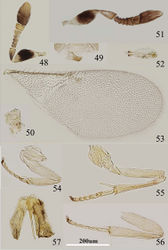Metaphycus ericeri
| Notice: | This page is derived from the original publication listed below, whose author(s) should always be credited. Further contributors may edit and improve the content of this page and, consequently, need to be credited as well (see page history). Any assessment of factual correctness requires a careful review of the original article as well as of subsequent contributions.
If you are uncertain whether your planned contribution is correct or not, we suggest that you use the associated discussion page instead of editing the page directly. This page should be cited as follows (rationale):
Citation formats to copy and paste
BibTeX: @article{Wang2013ZooKeys285, RIS/ Endnote: TY - JOUR Wikipedia/ Citizendium: <ref name="Wang2013ZooKeys285">{{Citation See also the citation download page at the journal. |
Ordo: Hymenoptera
Familia: Encyrtidae
Genus: Metaphycus
Name
Metaphycus ericeri Trjapitzin, 1967 – Wikispecies link – Pensoft Profile
- Metaphycus ericeri Trjapitzin, 1967: 185. Holotype +, Russia–Primor‘ye Kray.
- Metaphycus ericeri Trjapitzin: Trjapitzin 1975[1]: 10; Trjapitzin 1989[2]: 345.
Female
Body length, including ovipositor about 0.8 mm. Frontovertex pale orange; pale brown in ocellar area, yellow between occipital margin and posterior ocelli; immaculate from occiput to base of mandible; rest of head, except occiput, white; antenna (Fig. 48) with radicle brown-yellow; scape with both faces blackish, only extreme apex and extreme distal yellow, dorsal margin pale black; pedicel dark brown in proximal half, otherwise white; F1–F4 dark brown, F5–F6 white, clava dark brown, becoming paler towards apex, apex paler brown; occiput with a large dark brown area above foramen, rest white; neck of pronotum dark brown, posterior margin translucent white, lateral spots relatively large and distinct, rest white; dorsum of thorax orange; sides and posterior margin of mesoscutum and axillae inconspicuously bordered pale brown; setae translucent orange, silvery in most lights; tegula white with apex pale grey-brown; metanotum orange; mesopleuron pale yellow; prosternum and mesosternum pale yellow; legs (Figs 54–56) mainly pale yellow and mid tibia with a faint brown marking; fore wing (Fig. 53) hyaline and with linea calva interrupted, venation yellow-brown; hind wing hyaline; propodeum medially orange; gaster mostly orange but brown dorsally from cercal plates to near apex, ovipositor sheath yellow.
Head with polygonally reticulate sculpture and mesh size slightly less than that of one eye facet; ocelli forming an angle of about 50°; eye not quite reaching occipital margin, separated by much less than diameter of a facet; frontovertex not parallel-sided, becoming slightly broader anteriorly from the narrowest point which is slightly in front of posterior ocelli; scrobes shallow and U-shaped; antenna with scape about 2.3? as long as broad; funicle with F1–F4 smallest, subequal and transverse, F5 a little larger but transverse, F6 largest, linear sensilla only on F5 and F6; clava 3-segmented, its apex more or less rounded but with a short slightly oblique truncation; mandible relatively broad with three subequal, apical teeth (Fig. 49); palpal formula 2-2 (Fig. 50), thorax dorsally with notaular lines present only anteriorly; fore wing venation and setation as in Fig. 53; ovipositor (Fig. 57) hardly exserted, about 5.4? as long as ovipositor sheath.
Relative measurements: HW 14, FV 4, FVL 9,POL 2, AOL 3, OOL 1, OCL 1, POD 1, AOD 1, EL 8, EW 6, MS 5, SL 7, SW 3, FWL 36, FWW 15, HWL 24, HWW 5, OL 8, GL 1.5, MT 13.
Male. Length 0.65–0.70mm, almost identical to female but for genitalia and antenna, coloration of gaster. Pedicel white and with clava relatively more slender and solid, funicle brown (Fig. 51); genitalia (Fig. 52) with digitus long and slender apically with two hooks; aedeagus sharply pointed at apex.
Distribution
China (Liaoning), Russia.
Host
Material examined
China: 3 ++, 6 >>, Liaoning, Xiuyan, 2010.VI, Coll. Y. Q. Xi (IZCAS); 2 ++, 1 >, Liaoning, Shenyang, 2009.VI.12, Coll. Y. Q. Xi (IZCAS).
Diagnosis
Scape about 2.3? as long as broad; legs mainly pale yellow and mid tibia with a faint brown marking; gaster mostly orange but brown dorsally from cercal plates to near apex, ovipositor sheath yellow; ovipositor about 5.4? as long as ovipositor sheath.
This species is similar to Metaphycus helvolus in appearance. It can be separated from Metaphycus helvolus as follows: dorsal margin of scape pale black; linear sensilla on F5 and F6 (in helvolus dorsal margin of scape yellowish, linear sensilla absent on F5), head is about 3.5? as broad as frontovertex, the ovipositor about 0.6? as long as mid tibia (in helvolus head about 3? as broad as frontovertex, and the ovipositor about as long as mid tibia).
Taxon Treatment
- Wang, Y; Li, C; Zhang, Y; 2013: A taxonomic study of Chinese species of the alberti group of Metaphycus (Hymenoptera, Encyrtidae) ZooKeys, 285: 53-88. doi
Other References
- ↑ Trjapitzin V (1975) Contribution to the knowledge of parasitic Hymenoptera of the genus Metaphycus Mercet, 1917 (Hymenoptera, Chalcidoidea, Encyrtidae) of the Czechoslovakian fauna. Studia Entomologica Forestalia 2 (1): 5-17.
- ↑ Trjapitzin V (1989) Parasitic Hymenoptera of the Fam. Encyrtidae of Palaearctics. Opredeliteli po Faune SSSR Zoologicheskii Instituta Akademii Nauk SSR, Leningrad 158: 1-489.
Images
|
